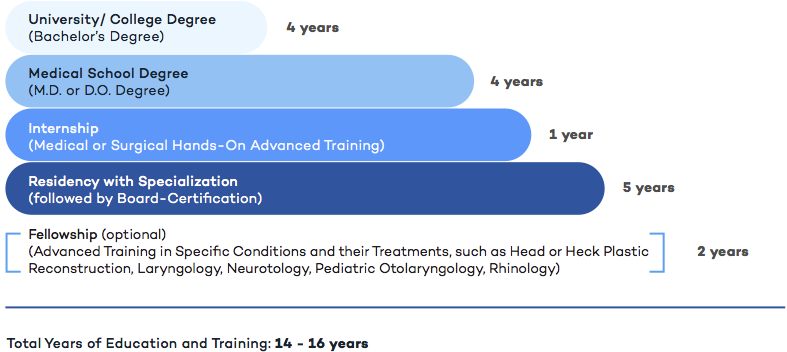

An Otolaryngologist, also known as ENT, is a Board-Certified Doctor who treats and diagnoses diseases of the ear, nose, throat, head, and neck, focusing on: the auditory system, the management of the nasal area, and the function of the aero-digestive tract. Otolaryngologists can undertake surgical procedures on the tissues, muscles, and other components of the head and neck region, and dispense medications.
The level of expertise to treat a specific condition and credentials are important factors when choosing the right physician. You may do your diligence and check the credentials and practice style of the doctor with the help of your family and friends, checking their history and looking into what other patients have to say about their experience under the doctor’s care.
Otolaryngologists are doctors (M.D. or D.O.) with advanced medical degrees and training. The following is a representation of the years of education and training that an Otolaryngologist has undergone.

OTO from the Greek word ‘ous’ for ‘ear’, RHINO from the Greek word ‘rhis’ for ‘nose’, and LARYNGO from the Greek word ‘larinx’ for ‘throat’ + LOGY from the Greek word ‘logia’ which means ‘logic’ or ‘the study of’.
An Otolaryngologist will treat an extensive list of conditions related to the ear, nose, throat, head, and neck, including:
Hearing Loss: Inability to hear sounds due to injury to the inner ear or nerve damage. Symptoms may include difficulty hearing consonants, needing to turn up the volume of your television, and frequently asking others to speak more slowly.
Tonsillitis: Infection of the tonsils, two masses of tissues located in the throat that filter germs and produce antibodies. Symptoms may include fever, sore throat, and white and/or yellow coating of your tongue.
Sleep Apnea: Obstruction of the airway and brief cessation of breathing during sleep. Symptoms may include loud snoring, occasionally waking up with a choking or gasping sensation, and sleepiness.
Ear Pain: Infection of the ear due to germs entering the ear and causing pain. Symptoms may include nausea, vomiting, and earache.
Allergy: Reaction by the immune system to substances, including pollen, dust mites, mold spores, food, insect stings, and medicine. Symptoms may include sneezing, swollen lips, eyes or face, and rash.
Thyroid Cancer: Cancer in the thyroid, a butterfly-shaped gland in your neck that produces hormones. Symptoms may include a lump in the neck, trouble breathing, and difficulties swallowing.
Sinus Infection: Cavities in the skull become inflamed by bacteria, viruses, or allergies. Symptoms may include fever, worsening of headache, and cough.
Vertigo: Sudden spinning sensation involving a movement. Vertigo can cause balance issues. Symptoms may include nausea, vomiting, and abnormal eye movements.
Tinnitus: A ringing in your ears most commonly caused by stress or noise damage. Symptoms may include intermittent or continuous sound in your ear.
Dysphagia (Swallowing Issues): Difficulties moving food from the mouth to the stomach. Symptoms may include pain swallowing, drooling, and having frequent heartburn.
Head and Neck Cancer: Cancer of the mouth, throat, salivary glands, and sinus cancer. Symptoms may include unexplained weight loss, frequent coughing, and headache.
Ultimately, Prevention is the most important step towards maintaining the health of your ear, nose, throat, head, and neck. The American Academy of Otolaryngology Head and Neck Surgery (AAO) recommends screening all newborns for hearing loss after 1 month. Regular hearing examinations can help your Otolaryngologist to detect conditions early on. When you visit your Otolaryngologist, you will receive important information regarding how to prevent hearing damage, as well as how to promote your overall heath.
Important topics include:
• use ear protection in loud environments. • treat tonsillitis in order to prevent airway obstructions.
• treat esophageal reflux.
• adequate hydration.
• maintain a healthy body weight.
• avoid alcohol.
• stop smoking.
Finding the right physician is an important first step to get the right treatment. Otolaryngologists are trained to offer a wide range of treatment options that are tailored to your specific condition. Personalized plans will help you to manage your diseases.
You can read more about Otolaryngology in the following links:
https://www.entnet.org
https://www.entnet.org/content/our-campaigns
https://www.enthealth.org/whats-an-ent/
https://www.enthealth.org/conditions-treatments -a-z/